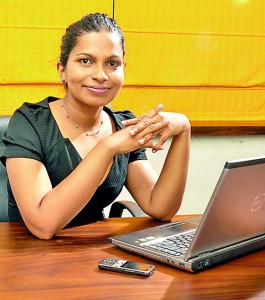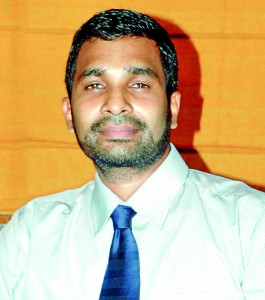Stress, anxiety higher as technology advances in SL
Increasingly, in Sri Lanka, as technology advances, and companies demand more from their employees, there are higher levels of anxiety and stress, emotional disengagement, grossly imbalanced lives with a tendency for quick fixes, affecting health and loved ones, and leading to high rates of divorce, abuse and conflict in families and communities, according to certified life coach Dr. Pujitha Silva. Overall, these issues also reduced work productivity and added to the costs of maintaining a healthy work population.
Having started his coaching career in 2012, with the launch of his Full Life Coaching agency in Australia, Dr. Silva also highlighted that he provided “[coaching] for the company executive and corporate leaders towards improved personal effectiveness and growth.

Rozaine Cooray
“Additionally, we offer a specialised coaching service that caters to engineers at all levels, since I understand how engineers think and how they operate, being one myself and also through my experience as a lecturer in engineering in Australia and currently at the University of Moratuwa,” he noted.
“We specialise in using the coaching method to help our clients move forward in their goals. The coaching method draws out the answers from the client and helps them take ownership towards the changes they want to make and support them through the transition period. Our uniqueness is in the tools and specially designed activities we use in our workshops to help our clients become self-aware, the most foundational and essential key towards any long lasting change,” elaborated Dr. Silva.
At the same time, Dr. Silva also signalled that, for his customers, his service’s “expectations and goals can vary from personal life goals such as losing weight, improving their relationship with the spouse, to learning to control their anger to corporate goals that involve improving performance at their job, or managing a conflict at work or helping lead change in an organisation. The goals always come from the client and our role is to help them get clarity and awareness on those goals and walk them through the process of change. Sometimes, the client company may want an employee coached towards a particular outcome. We then work with the employee to help them own this change so that they will feel empowered at the end of the session, having accomplished something they had ownership over rather than was imposed on them”.
Meanwhile, the Full Life Coaching agency is also partnered with Sri Lanka-based Forte, a people development consultancy primarily geared around the needs of organisations. Founded by noted Business Psychologist Rozaine Cooray, the consultancy recently celebrated five years in business.

Dr. Pujitha Silva
According to Ms. Cooray, “Forte is a consultancy for organisational and people development embedded in the findings from Industrial/Organisational Psychology, Sociology and group dynamics. Even though Forte was first customising processes and programmes only to the corporate and work sectors, we have now diversified into Education in terms of training teachers and career guidance for students in both schools and universities, not-for-profit and Non Governmental Organisations in training high achievers from different parts of the island and projects on empowerment and trauma alleviation in the post war areas”.
She also added that the “greatest milestones for Forte are, (1) its clients spanning from multinational companies to start-up companies, (2) self-funded project in Jaffna that focused on empowerment through creative therapies for groups of 65 school chilren in Karainagar, 10 war widows, and 25 social workers from Vanni, who still use these tools in their own communities over a period of one year in 2012, and (3) publications and presentations in international conferences based on on-going research. We are also proud of the increasing number of university students who have benefitted from our career guidance”.
Asked for her advice on the current needs of Sri Lanka, in terms of people development, Ms. Cooray, who is also a regular contributor to the Business Times, opined; “We need people who think creatively, who can understand the different variables that impact on productivity and performance, well-being of personnel and an organisation as a whole, how different people react to change differently and how people from different disciplines are needed to put the pieces of a puzzle together. We need people who can understand how outward growth/development as an individual, company, community or country as a whole have to be synchronised with its inward growth. We need people who can not only bring about new innovations but also who can solve current social and economic problems in the country. People who are not necessarily high in academic IQ but are street smart and team players. We need to have people who can bridge the gap between what universities produce and what the real work world requires”.
Commenting on the trends she has witnessed in the corporate arena, Ms. Cooray stated; “Some of our latest research reveals the changing culture of the organisation due to the entrance of Generation Y and Millennials to the workplace, from issues of boredom to lack of loyalty to the organisation. It has also revealed a paradigm shift on perceptions of what work is, what it should be, how work is accepted, and how things are done. We also see how the decreasing work/life balance is taking a toll on the unit of family and how especially female workers are constantly worried about the challenges of parenting for kids born into a fast-paced technological world. Increased number of highly qualified individuals doing mundane jobs in which they cannot add much value, increased number of females obtaining higher qualifications but who are stagnated at the glass ceiling are some of the other findings”.
Concluding, she also signalled that teachers too were facing challenges in relation to their competence in handling children with deteriorating values and ethics, adding that the same is “reported in organisations in terms of ethical behaviour, external influences of power, poor leadership and attitudes and mindsets misaligned with the current issues at hand. A very competitive organisational and educational culture and a mentality of quick fixes have also set high expectations to change and adapt over night, to sacrifice what may be important to individuals [replaced with a] cutthroat, back-stabbing culture due to insecurities, jealousies, power and lack of awareness of oneself and others”.


